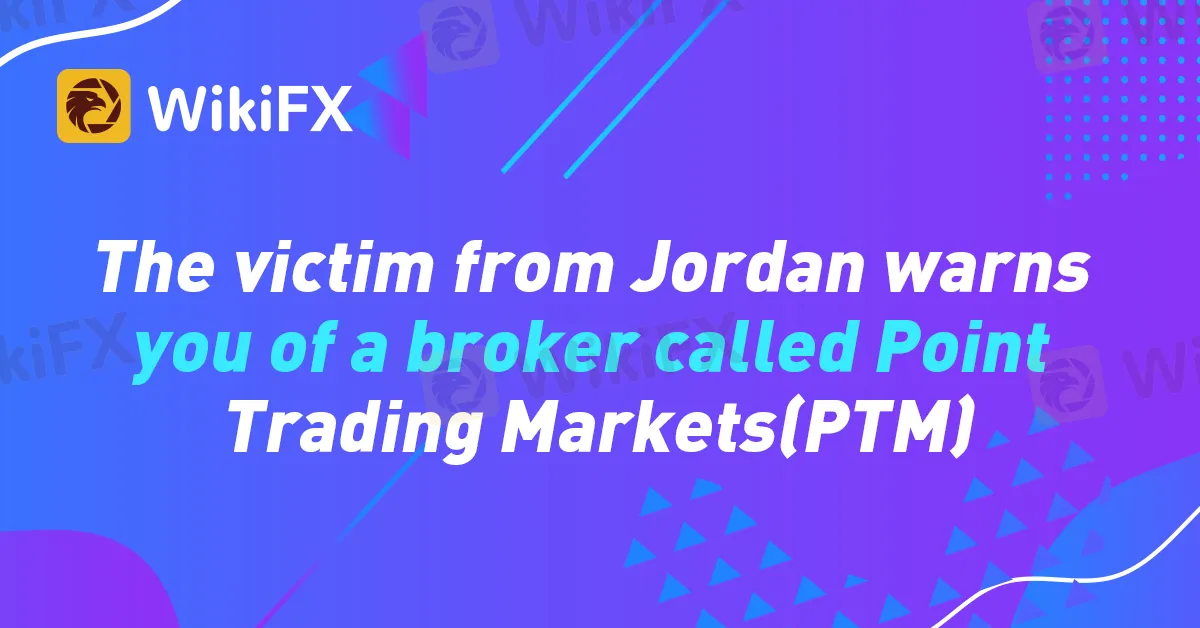The victim from Jordan warns you of a broker called Point Trading Markets(PTM)
Abstract:Recently one investor from Jordan, Mr. Ahmad told WikiFX that a broker called Point Trading Markets (PTM) refused his withdrawal requirements. Protecting the legitimate rights and interests of forex traders are always the primary concern of WikiFX. In this article, we will expose how PTM scammed the trader’s money based on the evidence gathered by WikiFX.

About WikiFX
WikiFX is an authoritative global inquiry platform providing basic information and regulatory license inquiries. WikiFX can evaluate the safety and reliability of more than 45,000 global forex brokers.
About Point Trading Markets (PTM)
PTM is an online forex broker registered in Ukraine. It has only experience of less than one year. WikiFX has given this broker a low rating of 1.03/10 as it is not regulated by any regulatory institution.

Mr. Ahmad, who is from Jordan, is the victim of this case, he told WikiFX about the situation he met while investing in PTM. Mr. Ahmad wanted to get assistance from WikiFX. He contacted WikiFX and reported the fraud of PTM to WikiFX.


Description of the case in brief
Mr. Ahmad claimed that last December, he requested a withdrawal to PTM. At first, PTM promised to pending approval but the victim did not receive the fund. Customer service is not responding from day one except thru emails only. Then the account is deleted from PTM without Mr. Ahmads permission.
Evidence gathered by WikiFX
Mr. Ahmad told WikiFX that there are 3 withdrawal requests that have been declined ($1389+1500+1600) and the broker didn't return back the amounts in the account. He made a $9000+ profit on top of my deposits of $4700, However, he received no response from the support team of PTM.



The Relationship Between PTM and Raynargroup
Mr. Ahmad told WikiFX that if you click on the “Web trader” now, it takes you to another platform called Raynargroup.com.


The victim believed that PTM is doing business now under a new name “Raynargroup LLC” which has the same address on the website raynargroup.com
Conclusion
WikiFX has given this broker a low score of 1.03/10. And we find out that this broker is not regulated by any regulatory institution. Many scam brokers like to make excuses and ask clients to deposit more money but reject clients withdrawal requests. The reason why WikiFX exposed this case to the public is to remind all traders of the potential risks. After all, what happened to Mr. Ahmad could happen to any of us. All traders should be vigilant when investing in a broker.
WikiFX is actively reaching out to the victim and other traders hoping to find more evidence to help him resolve the problem. Please stay tuned for more information.
WikiFX keeps track of developments, providing instant updates on individual traders and helping investors avoid unscrupulous brokers. If you want to know whether a broker is safe or not, be sure to open WikiFXs official website (https://www.WikiFX.com/en) or download the WikiFX APP through this link (https://www.wikifx.com/en/download.html) to evaluate the safety and reliability of this broker!

Read more

How Far Will the Bond Market Decline?
Recently, the yield on the U.S. 10-year Treasury bond reached a new high since April 2023, soaring to 4.7%.

Rising Risk of Japan Intervening in the Yen's Exchange Rate
The Japanese yen faces both internal and external pressures, with a potential intervention by the Japanese government looming.

Is the stronger dollar a threat to oil prices?
Oil prices dropped more than 1% on Wednesday, mainly due to the strengthening of the dollar and the increase in U.S. fuel inventories, which collectively suppressed the price rise.

RM5.9M Lost to "Davidson Kempner Capital Management" Facebook Scam
A private contractor in Malaysia faced a devastating loss of over RM5.9 million after falling victim to a fraudulent investment scheme promoted on Facebook. Tempted by the scheme’s impressive claims and credentials, the victim began investing in September 2024. The investment process required him to download an application called A-Trade, which was readily available on the Apple Store.
WikiFX Broker
Latest News
SQUARED FINANCIAL: Your Friend or Foe?
Big News! UK 30-Year Bond Yields Soar to 25-Year High!
High-Potential Investments: Top 10 Stocks to Watch in 2025
Why Is Nvidia Making Headlines Everywhere Today?
Discover How Your Trading Personality Shapes Success
US Dollar Insights: Key FX Trends You Need to Know
FINRA Charges UBS $1.1 Million for a Decade of False Trade Confirmations
BI Apprehends Japanese Scam Leader in Manila
Bitcoin in 2025: The Opportunities and Challenges Ahead
Join the Event & Level Up Your Forex Journey
Rate Calc

